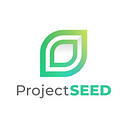Game Economy Explained: What model Project SEED uses?
Building a smart game economy is important to navigate its revenue structure and drive a successful game. As a one-stop multichain gaming platform, Project SEED has incorporated both play-and-earn and free-to-play models into its in-game economy with a central focus for our players.
Let’s learn about the three economies that are currently popular amid the current gaming development: play-and-earn, free-to-play (F2P), and pay-to-play (P2P) and see what’s the difference between Project SEED’s game economy model and those of others.
Play-and-earn: a new archetype for open crypto economies
Play-and-earn can be considered the latest business model in the ever-evolving gaming industry. It gives control and ownership of in-game assets to regular players and gaming enthusiasts, turning them into an essential governing force with the power to majorly influence within the gaming world. It also involves giving players financial incentives to play and progress through games.
With the emergence of blockchain technology, this model is experiencing massive success. Gamers can simply increase the value of their in-game assets by playing the game, as given to them for this active participation. Paired with blockchain, the assets are often tokenized as NFTs, gaming weapons, tools, or cryptocurrencies.
In Project SEED, players have the opportunity to get rewards from the efforts made in its ecosystem through our token and NFTs such as SHILL. By holding them, they are able to receive in-game airdrops, secondary token distribution, governance, and other great in-ecosystem rewards and benefits.
Here’s to any gamer’s sweetheart: Free-to-play
Free-to-play games allow players to enjoy a game without having to make any purchase or heavy financial commitment. They can access a notable amount of the game’s content and at the same time, are not required to prepay in order to play the games.
Axie Infinity, a major case in the blockchain gaming industry exploding in recent years but coming with a steep initial cost that might not be everybody’s favor, has left many gaming enthusiasts looking for free alternatives.
This growing demand drives a huge potential in the making of more F2P games in the market. Project SEED is one of the viable choices, providing free-to-play games that don’t cost you anything upfront built in a diverse ecosystem where users can also enjoy other blockchain-powered services.
The old path of Pay-to-play
In contrast to free-to-play games, P2P games require players to pay to use their games or services. They may also have to purchase upgrades to gain an advantage over other players such as leveling up skills or weapon enhancements as they progress through the game. In some other cases, the payment is also necessary to maintain their playing account.
Project SEED, a one-stop multichain gaming ecosystem, aims to accelerate mass adoption and take the blockchain gaming industry to the next level through our free-to-play and play-and-earn model. This brings the ultimate power to players in our ecosystem, giving them the best of both worlds where they can enjoy an open gaming economy with zero financial hassle.
Follow Project SEED to witness the journey of disrupting the blockchain gaming world:
Telegram: https://t.me/ProjectSeed
Discord: https://discord.gg/wDSyjZ7HvH
Facebook: https://www.facebook.com/projectseedgame
Twitter: https://twitter.com/projectseedgame
Instagram: https://www.instagram.com/projectseedgame/
Website: https://projectseed.io/
